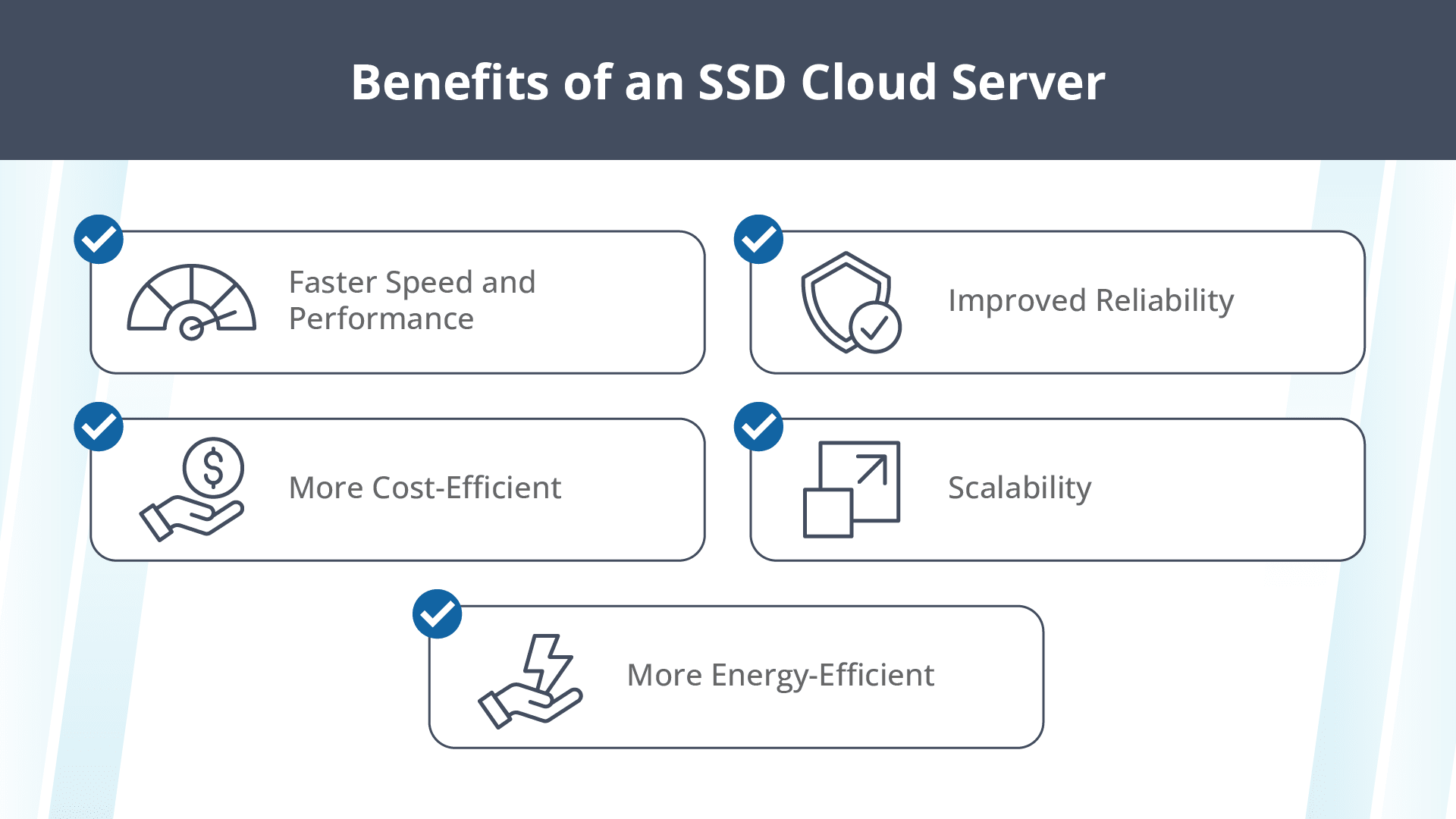SSD cloud server: What is it, and how does it work?
It’s no secret that cloud computing has become one of the most widely adopted technologies in recent years. According to data from McKinsey, most companies aim to have cloud spending represent 80% of their total IT-hosting budget this year.
But did you know that many companies now host their content on cloud servers with SSD storage?
These SSD cloud servers provide numerous benefits, including data safety, lightning-fast speeds, and improved performance.
Let’s explore what SSD cloud servers are and how they work. We’ll also look at their benefits and how to decide if this type of server is right for you.
Here’s what we’ll cover:
Key points
- An SSD is a storage device that retains data in flash memory as opposed to a magnetic-based system like a hard disk drive, and an SSD cloud server is a virtual machine that uses solid-state drives for storage.
- An SSD cloud server is created using virtualization and cloud computing technology.
- Benefits of an SSD cloud server include faster speed and performance, better scalability, improved cost and energy efficiency, and increased reliability.
- SSD cloud servers are useful for data centers, app developers, and high-traffic and eCommerce sites.
- Both SSD cloud servers and dedicated servers are excellent options, especially for businesses looking for better performance and security. Dedicated servers are suitable for companies that fall under strict industry regulations, like HIPAA, while SSD cloud servers have an edge in terms of scalability and cost.
What is an SSD?
SSD stands for solid-state drive. They were designed to replace the conventional hard disk drive (HDD) or magnetic storage solution that’s been in use for decades.
There are several advantages to using SSDs instead of HDDs. For instance, SSDs reduce latency and use flash technology to store information. And since they consist of NAND flash chips and a controller, they can store data even when there’s no power supply.
While SSDs and HDDs are both viable means of storing files, SSDs are faster and more efficient as they have no moving parts. In addition, SSDs have a longer lifespan because wear leveling allows them to minimize cell death. Non-volatile memory express (NVMe) SSDs are the fastest SSDs available.
Although SSDs are generally more expensive than HDDs, the difference in price between the two storage types has lessened since SSDs were first introduced to the market.
What is an SSD cloud server?
An SSD cloud server is a virtual machine that uses solid-state drives for storage instead of conventional HDDs. SDDs use flash memory cells to store data and, when combined with cloud computing technologies, result in a powerful and efficient storage solution that can be accessed from anywhere and at any time.
SSD cloud hosting solutions offer quick loading times coupled with outstanding performance. So, if you want the ultimate in reliability and speed, this is the way to go.
But how does it work?
How does an SSD cloud server work?
An SSD cloud server is created using virtualization and cloud computing technology. A cloud service hosting provider will pool hardware resources such as CPU, storage, and RAM and allocate them to a virtual machine (VM). This VM can then be accessed remotely via a secure connection like SSH.
SSD cloud servers: Benefits

In addition to taking up less space thanks to its small structure, a cloud server with SSD storage offers many benefits. These include the following:
Faster speed and performance
A cloud server with SSD storage supports more input/output (I/O) operations than traditional storage drives. This results in faster access to data and improved performance. Let’s say you run apps that use heavy read/write databases. In that case, switching to an SSD cloud server would significantly enhance your apps’ overall performance.
In addition to greater read/write speed, SSDs aren’t impacted by fragmentation. Fragmentation occurs when data is scattered across different parts of the drive. SSDs store data electronically, so regardless of where data is located on the drive, they still offer faster data access than hard drives.
More cost-efficient
SSD cloud servers are an excellent choice from a financial standpoint. That’s because cloud service providers generally offer a pay-as-you-go model. This means you’ll only pay for the infrastructure you’ll use, which can help you save a lot of money in the long run.
Moreover, not having to invest in physical hardware allows you to allocate those funds elsewhere, such as expanding into new marketplaces, developing products, or hiring additional staff members.
Improved reliability
The presence of moving parts in HDDs, like a spindle or actuator arm, makes them susceptible to damage, which could lead to hardware failure.
In contrast, data hosted on SSD cloud infrastructure doesn’t rely on one specific, physical machine. Instead, it’s supported by a network of interconnected servers. That means that if one server fails, the other springs into action.
It's worth noting that having data backups in place can protect against potential data loss caused by an unexpected event.
Overall, it’s hard to beat SSD cloud hosting when it comes to securing confidential customer and business data.
Better scalability
SSD cloud servers can be scaled up when demand is high and down when demand is low. Plus, you can adjust your resource usage to match your needs. This flexibility allows you to manage your resources and budget efficiently.
More energy-efficient
Unlike HDDs, which require more power to rotate the magnetic platters at high speed, SSD technology features no moving parts, resulting in reduced power consumption and heat generation.
By using SSDs in their servers, web hosting providers can offer their customers more affordable packages while lowering power and cooling costs.
Who needs an SSD cloud server?
Let’s take a look at some of the use cases for SSD cloud servers:
Data centers
Data centers can reduce costs with SSD cloud servers, as they don’t require any cooling equipment and can be set to conserve power. Not to mention, data centers will be quieter as SSDs don’t emit sound since they work with flash technology.
App developers
Developers can benefit greatly from using an SSD cloud server. The ability to spin up new instances at any time can significantly speed up the development process, leading to a faster time to market. In addition, cloud-based SSD servers make it easy to add new functions or features, as well as implement any necessary changes with minimal delay.
High-traffic sites
When many people try to access data simultaneously, it can stretch HDDs beyond their limits. SSD cloud server hosting, on the other hand, can accommodate higher levels of website traffic, leading to a more enjoyable user experience and ultimately boosting customer satisfaction, SEO rankings, and conversion rates.
eCommerce websites
Hosting an ecommerce site on an SSD cloud server can speed up the loading time of media-rich product pages and offer faster online transaction processing. These are important, as a delay of even four seconds can lead prospective customers to bounce.
SSD cloud server vs traditional dedicated server: Which is right for you?
By combining virtualization and cloud computing technology, an SSD cloud server delivers a storage service that’s faster, more scalable, and more dependable than hard disk drives. SSD cloud servers are ideal for sites with a large number of simultaneous accesses.
With a dedicated server, an entire server is dedicated exclusively to your needs. And when deployed internally, you can control how you set it up and choose your preferred operating system. This configuration is suitable for large businesses and companies that fall under strict industry regulations, such as HIPAA and PCI DSS.

Both SSD cloud servers and dedicated servers offer better performance and greater data security than a shared hosting services plan would.
However, when it comes to scalability, SSD cloud servers come out on top. This is because SSD cloud servers come with on-demand scalability, whereas a dedicated server typically requires you to plan ahead as it doesn’t include limitless resources.
Cost is another important distinction, as you’ll likely spend more on a full-blown dedicated server than an SSD cloud server.
Final thoughts: SSD cloud server — What it is and how it works
It’s clear that adopting an SSD cloud strategy is highly beneficial, no matter the size of your business. With this approach, you can expect faster data access, improved performance, scalability, and cost savings.
If you’re searching for a cloud hosting provider with a proven track record, look no further than Liquid Web.
Our high-performance, high-availability, managed cloud dedicated servers can accommodate your website’s varying traffic needs without prolonged downtime or extensive server maintenance.
Plus, our hosting plans come with multiple control panel options, like Plesk Web Pro and cPanel Pro. So whether you run your operations on Linux or Windows, we can help. Not to mention, our hosting packages include an integrated load balancer and firewall, DDoS attack protection, Cloudflare CDN, root access, a network uptime of 100%, and technical support.
Related Resources

Neil Golden
Neil contributed to solving the complex puzzle of evolution for a long time by obtaining his Ph.D. in Archaeology. These days, he digs the Linux servers in his role within the Liquid Web Monitoring Department instead of Paleolithic stone tools in the caves on archaeological sites. Instead of mammoths, he is now hunting for bugs on Linux servers. He has written numerous scientific and technical articles because writing is one of his biggest passions. In his free time, Neil composes music, reads novels, and travels the world.
Keep up to date with the latest Hosting news.



